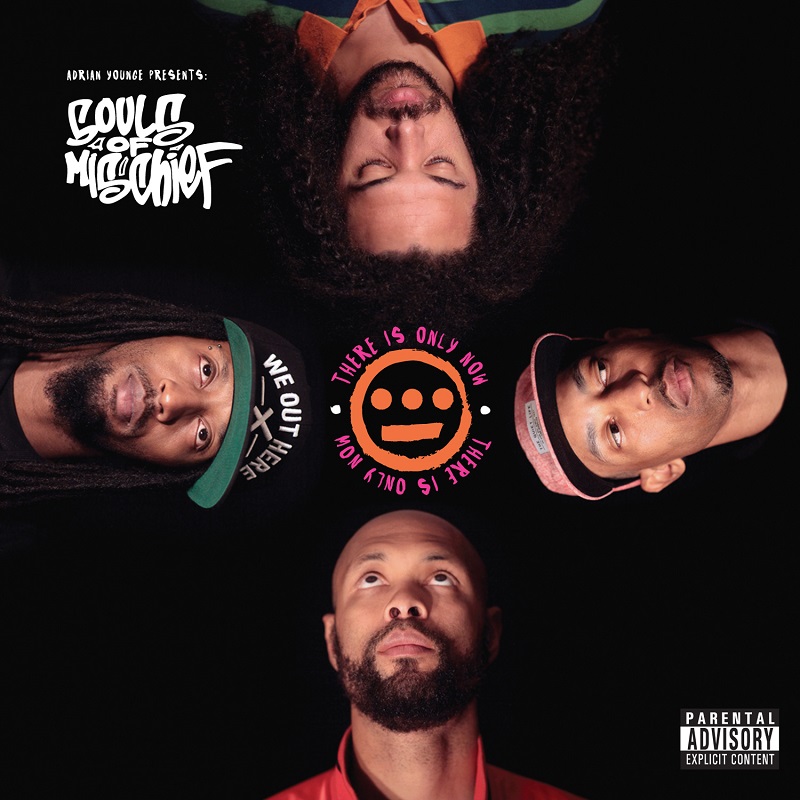Some people were simply born in the wrong era. I like to believe that I should have been born in the 50’s so I could have attended Woodstock in my late teens. But then there are people who could have been born in any era and still would have flourished. Adrian Younge is one of those people. The multi-talented musician and composer has worked with Ghostface Killah and The Delfonics to create new, original music on top of creating most of the soundtrack to the Blaxploitation film, Black Dynamite. For his latest project, There Is Only Now, Adrian collaborated with Oakland’s Souls of Mischief to tell a new story with some narration from Ali Shaheed Muhammad (A Tribe Called Quest). He captures the signature sound of Souls of Mischief on the new album in a way that old and new fans will be able to appreciate. If you disagree, you need to get your ears checked. We were able to ask Adrian Younge some questions about the project, which you can check out below.
You can pre-order your digital copy HERE and your preferred physical copy HERE.
How did the decision to have Ali Shaheed Muhammad narrate the album come about? Were any of the skits inspired by the radio from The Warriors?
I sought to create a modern Hip Hop album that was progressively based on the golden era. Souls of Mischief and A Tribe Called Quest are seminal members of that alumni. I felt that incorporating Ali Shaheed Muhammad, a member of ATCQ, would further enhance the positive feeling of that elapsed time. He served as the narrator of an epic Souls Of Mischief tale and also helped in producing songs on the There Is Only Now album. In narrating, he took the approach of the radio DJ, from the movie,
Warriors, and somehow how performed it in a very 90’s Hip Hop manner. Ali is the sh*t!
Was there a specific routine you’d do to get into that mindset of when De La Soul and Souls of Mischief held sway in the Hip-Hop industry?
Hell yeah, and we started by just having them in the room together for every song. That’s how Hip Hop used to be recorded, for the most part. People spent time together, having lunch, telling stories, sleeping in the studio, etc. We did everything that they would have done in the 90’s, including recording to 2 inch analog tape, using vintage mics, etc. To them, it was like going back 20 years, but for me, it was like putting them ahead of the modern curve another 20 years, if that makes any sense.
Everyday Hip-Hop probably gains new fans. Do you think that it’s a problem that those fans never go back and listen to classic albums like 93 Til Infinity and Bizarre Ride II The Pharcyde? Why or why not?
I only think it is a problem if the consumer is an avid music listener. Some fans of Hip Hop don¹t give a sh*t about music and I’m okay with that; however, if they are the type of fan that has an elitist approach to the art, they better know their history. They should know the etiology of Hip Hop because the proliferation of this subculture is based upon the incremental additions of new perspectives and ideas. Bizarre Ride and 93 Til are quintessential examples of that and these albums should not be forgotten.
A few tracks switch up to a different beat half way through or near the end. I’m noticing this as a trend more with even the major Hip-Hop stars of today. Why did you choose to do that?
I¹ve always incorporated these kind of changes within music because I love progression. When an artist can create an unexpected change, that makes sense musically, it tends to excite the listener and push the level of music above the status quo. As a DJ, my favorite breaks incorporate this method of production and I want to continue in this tradition.
Your production style really matched the classic SOM sound with a smooth melody matched by hard hitting drums that pierce through yet complement it. Was that a deliberate sound that you aimed for or something that naturally came from working with the SOM?
Yes! There is nothing more important than the bass and the drums. I sought to incorporate a drum style that is akin to sounds heard on Low End Theory and ’93 Til infinity, synthesized with the musical perspectives of artists like Jazz/Soul drummers Idris Muhammed and Joseph “Zigaboo” Modeliste of The Meters.
From the Delfonics to Ghostface and now SOM, you work with some of music’s greats. Who’s next on your dream list of artist collaborations?
I’m currently working on a few albums such as Bilal, Ghostface Killah, Something About April II, and a very special album with Ali Shaheed Muhammad. It’s hard to say who my additional dream list of artists are because I¹m already working with them.
What was your favorite part about working with SOM?
Just being impressed with their kinship and openness to allow an outside producer produce their album. They are so talented and so endearing to people they value. It was an experience that I will never forget.
What’s your favorite SOM track not on the project? And on the project?
Not on the project, it’s “Make Your Mind Up,” on the 93 Til Infinity album; on the new album, my favorite track is “The Last Act.”
Bryan Hahn couldn’t be more excited for an album like this one. He’s on Twitter, too (@notupstate).

